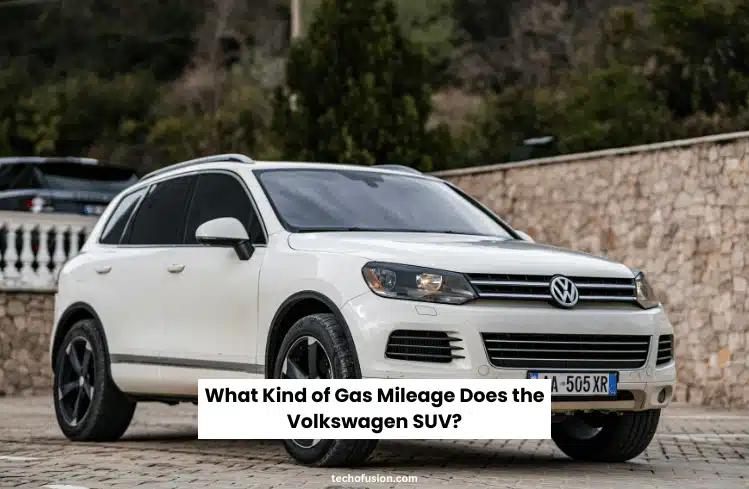Fuel performance is one of the maximum crucial concerns for capacity clients while looking at a brand-new automobile. As gas prices fluctuate and environmental awareness grows, understanding what kind of gas mileage does the Volkswagen SUV offers becomes increasingly vital. The gasoline efficiency of numerous Volkswagen SUVs is examined in this article, with an emphasis on the favored Volkswagen Atlas. Related models along with the Tiguan and the ID.4 electric SUV also are tested. We will answer typically asked questions and discuss topics like real-world overall performance, opposition comparisons, and gas-performance recommendations.
Being Aware of Gas Mileage
What Gas Mileage Means
The efficiency with which an automobile consumes gas is indicated with the aid of its fuel mileage, which is measured in miles per gallon (MPG). It suggests ways a vehicle can pass on a gallon of gas. An automobile with a greater MPG is extra efficient, which means the driver will pay much less for gasoline. Because it impacts general ownership costs and environmental factors, fuel mileage is essential to clients, in particular folks who power often or have lengthy commutes.
The Value of Gas Mileage to Customers
The fuel economic system is a prime attention for plenty of shoppers when choosing an automobile. Knowing fuel mileage enables clients to make smart choices in mild of developing gas costs and environmental worries. Over time, the fee of possession for a vehicle with higher fuel performance can be significantly reduced, liberating up funds for protection or other prices. Customers are also trying to find vehicles that are not only low-cost but also ecologically pleasant due to governments enforcing stricter emissions laws.
Factors Influencing SUV Gas Mileage
SUVs’ fuel mileage is suffering from quite several things, which include engine length, weight, aerodynamics, and driving situations. Heavy automobiles need greater energy to run, and larger engines commonly use more gas. A vehicle’s capability to tour via the air is motivated by its aerodynamics; streamlined designs normally provide better gas economy. Gas mileage may be adversely suffering from riding behaviors like fast acceleration and common braking. Finally, common fuel performance is also inspired with the aid of variables which include tire pressure, weather, and terrain.
Overview of Volkswagen SUVs
In the SUV marketplace, Volkswagen has made a call for itself by way of generating a whole lot of fashions that cater to a wide range of purchaser demands. The portfolio consists of the groundbreaking Volkswagen ID.4, an all-electric SUV, the roomy Volkswagen Atlas, and the little Volkswagen Tiguan. Whether you want an automobile with plenty of room for a circle of relatives holidays or a smaller automobile for town use, each of those fashions can accommodate your tastes.
The Atlas specifically has drawn awareness for its contemporary safety capabilities, technology integration, and spacious indoors. Knowing the overall performance specifications of various automobiles aids in choosing the appropriate option, because gas mileage has end up a vital issue for clients. This article will especially focus on the Volkswagen Atlas, closely studying its gas efficiency and contrasting it with other cars in its elegance.
What Kind of Gas Mileage Does the Volkswagen SUV?
Gas Mileage Overview Across Models
When evaluating what kind of gas mileage does the Volkswagen SUV offers, it’s crucial to compare various models. Below is a detailed summary table comparing gas mileage for the Volkswagen Atlas, Tiguan, and ID.4:
| Model | Engine Type | City MPG | Highway MPG | Combined MPG | Fuel Tank Capacity | Range (Miles) |
| VW Atlas | 2.0L Turbo I4 / 3.6L V6 | 21 | 24 | 22 | 18.5 gallons | 407 |
| VW Tiguan | 2.0L Turbo I4 | 23 | 29 | 26 | 15.9 gallons | 411 |
| VW ID.4 | Electric (Single Motor) | N/A | N/A | 250 miles | 82 kWh | 250 |
This table illustrates that the VW Atlas provides a respectable combined mileage of 22 MPG, which is competitive for a mid-size SUV. The Tiguan, being smaller, offers slightly better fuel economy VW atlas, while the all-electric ID.4 excels in range without consuming traditional fuel.
Fuel Economy VW Atlas
Detailed Analysis of Fuel Economy Ratings
The engine choice influences the Volkswagen Atlas’s gas mileage. The base 2.0L turbocharged I4 engine is ideal for everyday commutes since it moves an exquisite mix between efficiency and overall performance. In comparison, the 3.6L V6 engine makes use of more gasoline even though it offers greater strength for those who require more acceleration or towing ability. The Atlas is an ideal preference for households as it plays well against similar fashions with a blended gas financial system of 22 MPG.
Volkswagen Atlas MPG by Trim
Different trims of the Atlas can affect its gas mileage. The base model with the turbocharged I4 engine tends to yield better fuel economy VW Atlas compared to higher trims equipped with the V6. Here’s a breakdown of the estimated Volkswagen Atlas mpg by trim:
| Trim | Engine Type | City MPG | Highway MPG | Combined MPG |
| Atlas SE | 2.0L Turbo I4 | 21 | 24 | 22 |
| Atlas SEL | 2.0L Turbo I4 | 21 | 24 | 22 |
| Atlas SEL Premium | 3.6L V6 | 18 | 24 | 20 |
The data indicates that while the V6 engine delivers superior power, it sacrifices some fuel economy, particularly in urban settings. Consumers should consider their driving habits and needs when selecting a trim.
Comparing VW Atlas Fuel Economy to Competitors
When comparing the Fuel Economy VW Atlas to competitors like the Honda Pilot and Ford Explorer, it becomes clear that the Atlas provides a competitive advantage in terms of space and comfort. The Atlas outperforms the Pilot’s fuel economy in combined ratings, especially when comparing similar engine sizes. Furthermore, the Atlas offers advanced technology and a more spacious cabin, making it a preferred choice for many families looking for efficiency and comfort.

VW Atlas Fuel Economy Features
Engine Options and Their Impact on Mileage
The Volkswagen Atlas is available with two engine choices that significantly impact its fuel economy. The 2.0L turbocharged I4 engine delivers a balance of power and efficiency, making it suitable for everyday driving needs. This engine is right for each town and motorway travel because it maximizes gas efficiency whilst supplying a smooth use revel. However, for folks who need more strength from their SUV, particularly for off-street excursions or towing, the 3.6L V6 engine gives an additional layer of capability. It does, but, results in much less gasoline efficiency.
Driving Styles and How They Affect VW Atlas Fuel Economy
Volkswagen offers the Atlas some of using modes which are intended to enhance performance and performance. One noteworthy feature is the Eco mode, which optimizes fuel use and modifies throttle response to offer drivers better gas mileage on each day’s trips. Those who frequently tour small distances or deal with city traffic will in particular gain from this option. Drivers can revel in better fuel performance without notably compromising overall performance by selecting Eco mode, which appeals to consumers on tight finances.
Options for Electric and Hybrid Vehicles: Volkswagen ID.4
The Volkswagen ID.4, an all-electric SUV, is a wonderful choice for people searching for a greater environmentally pleasant alternative. The ID.4 is a fantastic choice for customers who care approximately the surroundings because of its wonderful variety of about 250 miles at an affordable price. Despite not the usage of fuel, its gasoline performance corresponds to that of traditional vehicles, with a focal point on reducing emissions and working charges. The ID.4 is a first-rate step toward an extra sustainable automobile destiny as Volkswagen continues developing its electric lineup.
Real-World VW Atlas Gas Mileage
Consumer Reviews and Experiences
Real-world fuel efficiency often differs from manufacturer claims. Under perfect instances, many drivers say their Volkswagen Atlas MPG commonly fits EPA figures pretty nearly. However, real fuel utilization can be greatly impacted by using variables that include driving fashion, load, and topography. It is critical to comprehend how person-using behaviors affect the gasoline financial system in view that customers who frequently journey in congested urban areas can also be aware that their gasoline mileage falls below the EPA’s metropolis score.
Testing Methodologies for Real-World Fuel Economy
Independent reviews and consumer reports often provide insight into real-world performance, showcasing various driving conditions and scenarios. Tests typically involve a combination of highway and city driving to give a holistic view of fuel efficiency. These tests often reveal that while the VW Atlas gas mileage may perform well in ideal conditions, variations in real-world scenarios can lead to different mileage outcomes, often resulting in slightly lower than-advertised figures.
Factors Affecting Real-World Gas Mileage
Real-international fuel mileage may be impacted with the aid of quite several things, along with riding habits, tire pressure, and maintenance. For most gas efficiency, it’s miles important to keep the proper tire stress because underinflated tires can boom rolling resistance, which raises fuel intake. Regular maintenance additionally ensures that the engine runs as correctly as feasible. Examples of this encompass replacing the air filter and converting the oil on a table. Last but no longer least, awful using practices like abrupt acceleration and common braking will lessen general gas intake, emphasizing how critical smooth using is.
Understanding the Fuel Economy Ratings
EPA Ratings Explained
Fuel performance rankings are decided with the aid of the Environmental Protection Agency (EPA) and the use of controlled checks that reflect normal circumstances. These scores deliver consumers a consistent manner to evaluate the gas economic system of diverse automobiles. However, it is essential to apprehend that a variety of factors, together with as riding situations, load, and maintenance, may additionally cause one-of-a-kind effects whilst using in the actual international.
How Volkswagen Achieves Its Fuel Efficiency Goals
Volkswagen uses modern-day engineering techniques to maximize gas financial systems throughout its range of vehicles. Volkswagen has advanced the overall performance and gasoline performance of fashions like the Atlas by using employing lightweight substances, state-of-the-art aerodynamics, and efficient engine technology. Vehicles that integrate layout and generation no longer fulfill but regularly surpass client expectancies in terms of fuel performance.
City vs. Highway Mileage Discussion
Customers should be aware of the difference between the town and toll road mileage. On highways, motors regularly use less fuel on account that they travel at consistent speeds and make fewer stops. On the opposite hand, a metropolis usually includes several stops and begins, which may decrease overall mileage. This pattern is reflected in the VW Atlas scores, which show that dual carriageway MPG is commonly more than town MPG. Understanding those variations would possibly assist customers in making properly knowledgeable alternatives concerning their expectations and riding conduct.

Tips for Maximizing Fuel Efficiency in Your Volkswagen SUV
Driving Practices That Improve Fuel Efficiency
Gas mileage can be substantially elevated by implementing unique riding practices. Improved gasoline efficiency can result from disposing of abrupt stops, accelerating smoothly, and maintaining a consistent velocity. Drivers can save gasoline and improve their usual driving experience by refraining from aggressive riding. To further maximize fuel mileage, the use of cruise manipulation on highways can assist keep a steady tempo.
Upkeep Advice for Increased Gas Mileage
To guarantee that your Volkswagen SUV operates at its peak efficiency, habitual upkeep is vital. Regular oil changes, air filter out replacements, and spark plug inspections are critical maintenance chores. Maintaining the engine well ensures that it runs effectively, which will increase gas efficiency. Additionally, maintaining tires well inflated and rotating them on an ordinary foundation will beautify handling and efficiency, to boost gasoline mileage.
Additions and Modifications to Boost Productivity
Certain improvements and accessories can increase the fuel efficiency of your VW Atlas. Lightweight attachments such as aerodynamic baggage carriers can improve fuel efficiency by reducing drag. Aerodynamic additions like rear spoilers and side skirts can also increase airflow around the vehicle, which will boost performance all around. Before making any changes, it’s important to look into how they can affect the vehicle’s performance and warranty.
Environmental Impact of Volkswagen SUVs
Comparison of Gas Mileage and Environmental Impact
Choosing a car that consumes less fuel, like the VW Atlas, can substantially reduce one’s carbon effect. Since a car’s gasoline financial system and emissions are without delay-related, better gas mileage commonly effects in decrease emissions. As customers end up extra environmentally aware, selecting vehicles with advanced gas efficiency is becoming increasingly vital. In addition to saving cash on fuel, drivers who use the Atlas also make contributions to environmental sustainability.
Volkswagen’s Commitment to Sustainability
As part of its willpower to sustainability, Volkswagen has made massive investments in electric-powered car technology and renewable power resources. Volkswagen’s shift to more environmentally friendly vehicles, such as the ID.4, shows the corporation’s dedication to lowering its impact on the surroundings even as persevering with to provide clients with high-quit cars. Cutting carbon emissions during their production approaches and promoting the usage of sustainable substances in their cars are two of the company’s ambitious desires.
Advantages of Selecting a Fuel-Efficient Car
Choosing a car that makes use of much less gasoline now not only saves cash at the fuel pump but also allows the environment. Reducing gas use enables fighting climate exchange by way of reducing the quantity of unfavorable emissions emitted into the ecosystem. Additionally, choosing a vehicle with better gasoline mileage guarantees compliance with policies as gas performance standards grow, making it a progressive preference for buyers.
Conclusion
In conclusion, understanding what kind of gas mileage does the volkswagen suv offers, particularly the Atlas, is essential for informed vehicle selection. The Atlas and different Volkswagen SUVs are terrific alternatives for households and environmentally aware drivers alike because of their aggressive gas efficiency, roomy cabin, and willpower toward sustainability. To maximize your riding enjoyment, keep in thoughts to stability of the several aspects that affect fuel efficiency and the significance of habitual renovation as you’re making your choices. Long-time period environmental benefits and giant fee financial savings can result from making a knowledgeable preference now.
FAQs
What is the Volkswagen Atlas’s traditional fuel economic system?
Approximately 21 mpg within the town and 24 mpg at the motorway make up the Volkswagen Atlas’s combined fuel mileage rating of twenty-two mpg.
What is the Volkswagen SUV’s fuel performance in terms of different manufacturers?
Volkswagen SUVs, especially the Atlas, have competitive gas performance as compared to different mid-length SUV brands like Ford and Honda.
Three Is the Volkswagen Atlas a gas-green preference for families?
With its generous size, current protection capabilities, and decent fuel efficiency, the VW Atlas is surely an incredible choice for families and is useful for everyday use.
Four What variables can impact my VW SUV’s gasoline mileage?
Tire pressure, maintenance techniques, using situations, and private driving behavior are a number of variables that would impact fuel mileage.
Five Does the Wox Vegan SUV portfolio consist of electric or hybrid models?
Indeed, Volkswagen sells the ID.4, an all-electric powered SUV with a notable range on affordable fee that offers a sustainable substitute for conventional fuel-powered motors.


